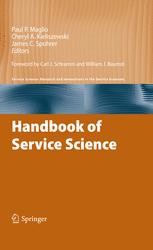

Most ebook files are in PDF format, so you can easily read them using various software such as Foxit Reader or directly on the Google Chrome browser.
Some ebook files are released by publishers in other formats such as .awz, .mobi, .epub, .fb2, etc. You may need to install specific software to read these formats on mobile/PC, such as Calibre.
Please read the tutorial at this link: https://ebookbell.com/faq
We offer FREE conversion to the popular formats you request; however, this may take some time. Therefore, right after payment, please email us, and we will try to provide the service as quickly as possible.
For some exceptional file formats or broken links (if any), please refrain from opening any disputes. Instead, email us first, and we will try to assist within a maximum of 6 hours.
EbookBell Team

4.4
62 reviewsTraditional service sectors encompass a wide variety of industries ranging from transportation, retail and healthcare to entertainment, banking, and insurance. As the service sector expands into the global economy, a new science of service is emerging, one that is dedicated to encouraging service innovation by applying scientific understanding, engineering discipline, and management practice to designing, improving, and scaling service systems.
This seminal reference considers Service Science to be the study of value co-creation, and finds abundant common elements and themes, common concerns and approaches that converge on this central, real-world phenomena. Handbook of Service Science takes the first major steps to clarifying the definition, role, and future of this nascent field. Incorporating work by scholars from across the spectrum of service research, the volume presents multidisciplinary perspectives on the nature and theory of service, on current research and practice in design, operations, delivery, and innovation of service, and on future opportunities and potential of service research.
Handbook of Service Science provides a comprehensive reference suitable for a wide-reaching audience including researchers, practitioners, managers, and students who aspire to learn about or to create a deeper scientific foundation for service design and engineering, service experience and marketing, and service management and innovation.
List of contributors includes:
Melissa A. Akaka.- John Bailey.- Guruduth Banavar.- Rahul C. Basole.- William J. Baumol.- Gaurav Bhalla.- Mary Jo Bitner.- Jeannette Blomberg.- David E. Bowen.- John R. Bryson.- Richard B. Chase.- Henry Chesbrough.- Eng K. Chew.- Daniel Connors.- Peter W. Daniel.- Andrew Davies.- Faridah Djellal.- Bo Edvardsson.- Shelley Evenson.- Ray P. Fisk.- Faïz Gallouj.- Susanne Glissmann.- Robert J. Glushko.- Michael Gorma.- Michael Gregory.- Dwayne D. Gremler.- Steve J. Grove.- Gerhard, Gudergan.- Evert Gummesson.- Anders Gustafsson.- Alan Hartman.- James L. Heskett.- Kazuyoshi Hidaka.- Barbara Jones.- Uday S. Karmarkar.- Per Kristensson.- Robert F. Lusch.- Linda Macaulay.- Richard Metters.- Ian Miles.- Aleksandra Mojsilovic.- Claire Moxham.- Rogelio Oliva.- Lakshmish Ramaswamy.- Guangjie Ren.- William B. Rouse.- Roland T. Rust.- Scott E. Sampson.- Pamela Samuelson.- Jorge Sanz.- W. Earl Sasser Jr.- Benjamin Schneider.- Carl J. Schramm.- John D. Sterman.- Stephen L. Vargo.- Lars Witell.- Valarie Zeithaml.- Anatoly Zherebtsov